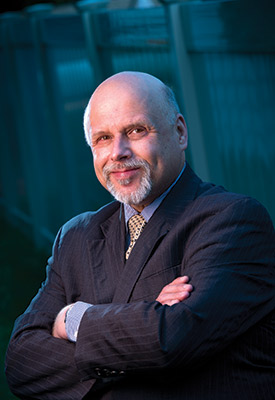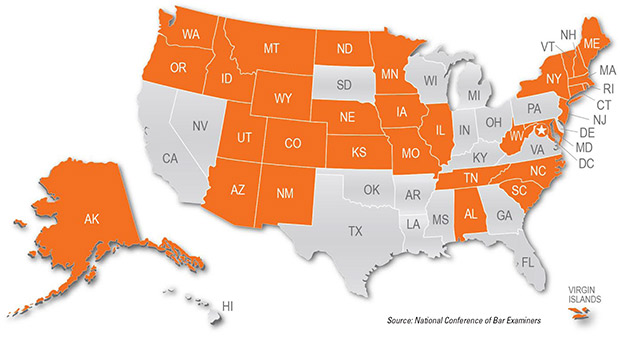Wisconsin shies away from uniform bar exam even as other states adopt it
By: Erika Strebel, [email protected]//July 31, 2018//
Wisconsin shies away from uniform bar exam even as other states adopt it
By: Erika Strebel, [email protected]//July 31, 2018//

Thanks to Wisconsin’s diploma privilege, Nick Zales didn’t have to take a bar exam to practice in state.
That privilege meant Zales, an appellate lawyer in Milwaukee, was able to avoid a rite of passage that most lawyers with degrees from other states must undergo before being able to practice.
Wisconsin’s diploma privilege applies to graduates of Marquette University Law School, where Zales went, as well as the University of Wisconsin Law School.
Despite enjoying the benefits of diploma privilege, Zales said new graduates might be better off if they were required to take a bar exam that would be recognized throughout the country. The current system, he said, is helpful only if graduates of Wisconsin schools plan to practice law exclusively in state. If they want to go anywhere else, they end up having to take a bar exam anyway.
With a universal exam, Zales said, new graduates at least wouldn’t have to devote time and money to passing a new test in each state where they are considering practicing law.
“It’s certainly worth looking into because the legal profession is in trouble right now,” Zales said. “Law students are coming out with a massive amount of debt.”
Zales is not alone in thinking this way. The country got one step closer last month to having a universal test for people entering the legal profession when Illinois became the 30th state to adopt the Uniform Bar Exam. Illinois is the third state bordering Wisconsin that has adopted that exam, joining Iowa and Minnesota.
Every time another state adopts the Uniform Bar Exam, the advantages that come with being able to take it increase for legal practitioners. In Wisconsin, though, many are still reluctant to giving up their state’s own exam.
What is the Uniform Bar Exam?
There are typically two ways to get admitted to practice law in a state: by taking advantage of admission by reciprocity — which typically requires furnishing some sort of proof that you have already practiced law elsewhere — or by sitting for the state’s bar exam. For new graduates who haven’t got the advantage of diploma privilege, there’s no choice but the second route.
Thirty states have now adopted the Uniform Bar Exam. The exam, also known as the UBE, is a product sold by the National Conference of Bar Examiners.
It has three components:
- the Multistate Bar Exam, which is a day-long test with 200 multiple-choice questions
- the Multistate Essay Exam, which is a half day-long test that has six 30-minute essay questions and
- the Multistate Performance Test, a half-day-long exam made up of two 90-minute skill tests

Individual states grade their own exams and decide exactly what scores should allow applicants to practice law within their borders. Some states, such as Washington, New York and New Mexico, add “local-law components,” which applicants must complete either before or after being admitted to their bars. In some states, a local-law component is administered as a separate exam. In others, it comes as part of continuing-legal-education courses.
Only in Wisconsin
Wisconsin’s bar exam, which is also a two-day exam, already makes use of parts of the UBE. The state specifically buys the Multistate Bar Exam component consisting of multiple-choice questions.
From there, though, Wisconsin’s exam begins to exhibit some differences. Wisconsin borrows a little from both the Multistate Essay Exam and Multistate Performance Test before going on to present its own essay questions.
For now, at least, there appears to be little interest in the UBE in Wisconsin. In December, the state’s Board of Bar Examiners, which administers and grades the state’s bar exam, voted not to recommend that the state adopt the UBE.
The decision came after the board had heard from a subcommittee that had studied the UBE for several months. Members of the subcommittee noted, among other things, that they were unsure how the UBE would affect diploma privilege and that adopting the UBE would require not only a change in Wisconsin Supreme Court rules but also in the scheduling of exam-grading sessions and board meetings.
Before its vote, the Board of Bar Examiners heard from both a representative of the National Conference of Bar Examiners and the deans of the University of Wisconsin Law School and Marquette University Law School. Joseph Kearney, dean of Marquette’s law school, said in a statement that he had previously encouraged the Board of Bar Examiners not to adopt the UBE.
“I do not think the UBE to be consistent with the state’s longstanding practice—displayed not only in the diploma privilege but also in the historical content of the bar exam—of ensuring study of Wisconsin law among those whose first admission to any bar is in this state,” he said.
Margaret Raymond, dean of the UW law school, declined to comment.
 Arguing for, against uniformity
Arguing for, against uniformity
In Illinois, proponents of the UBE noted that lawyers are tending more and more these days to practice in more than one jurisdiction.
“The switch to a portable bar examination acknowledges the changing reality while maintaining Illinois’ high standard of legal competency,” said Illinois Supreme Court Chief Justice Lloyd Karmeier in an official statement.
Steve Levine, a member of the Wisconsin Board of Bar Examiners and a lawyer out of Madison, agreed that lawyers are no longer as likely as they once were to confine their practice to a single state. He said Wisconsin’s diploma privilege confers an unfair disadvantage on graduates of out-of-state law schools.
People who hold diplomas from elsewhere have debt loads that are just as heavy as those borne by their counterparts in Wisconsin, he noted. Yet, because they still have to pass at least one bar exam to practice law, they have no guarantee they’ll be able to start a career in their chosen field.
Levine, a UW Law School graduate, was the only member of the Board of Bar Examiners to vote against the recommendation calling for the UBE to not be adopted in Wisconsin.
“I have always been in favor of adopting the UBE,” he said. “I think eventually, Wisconsin will have to adopt it and should adopt it.”
Despite having to take Wisconsin’s bar exam because he holds his law degree from the University of Missouri School of Law, Brown County Circuit Court Judge Marc Hammer, also a member of the Board of Bar Examiners, said he is against adopting the UBE because the exam doesn’t line up with what he deemed Wisconsin’s priorities.
One of those priorities, he said, is testing applicants’ knowledge of state law – something that the UBE generally does not do.
“In order to implement the UBE, we’d have to supplement it with a Wisconsin component,” Hammer said. “That’s not necessarily bad or wrong. It creates complexities. It’s not as simple as just adopting the UBE. … We know that our graduates from state schools have an understanding of state law but can’t make those assurances for our out-of-state folks.”
Zales, in contrast, questioned whether the bar exam should even be testing knowledge of state law.
“If some state has some unique laws or procedure, I think the CLEs would be a lot better way to address those than a bar exam,” he said. “Having practiced law for 29 years, these arcane things come up about once or twice a year.”
Zales said the bar exam should instead be used to ascertain both whether applicants have a thoroughgoing knowledge of foundational law and whether they can apply that law to the facts of a case.
“I want to know if you’re competent to be a lawyer,” he said. “So knowing the slight difference between Wisconsin and Illinois rules, I don’t know that it should be on a bar exam.” Follow @erikastrebel
Legal News
- Wisconsin joins Feds, dozens of states to hold airlines accountable for bad behavior
- Trump ahead of Biden in new Marquette poll
- Bankruptcy court approves Milwaukee Marriott Downtown ‘business as usual’ motion
- New Crime Gun Intelligence Center to launch in Chicago
- Arrest warrant proposed for Minocqua Brewing owner who filed Lawsuit against Town of Minocqua
- Wisconsin Supreme Court justices question how much power Legislature should have
- Reinhart named the 2024 Wisconsin law firm of the year by benchmark litigation
- Milwaukee’s Common Council now has the most African Americans, women and openly LGBTQ members ever
- Office of School Safety Provides Behavioral and Threat Assessment Management Training Ahead of 25th Anniversary of Columbine Shooting
- Wisconsin Supreme Court to hear arguments in Democratic governor’s suit against GOP-led Legislature
- Lawsuit asks Wisconsin Supreme Court to strike down governor’s 400-year veto
- Wisconsin man pleads not guilty to neglect in disappearance of boy
WLJ People
- Power 30 Personal Injury Attorneys – Russell Nicolet
- Power 30 Personal Injury Attorneys – Benjamin Nicolet
- Power 30 Personal Injury Attorneys – Dustin T. Woehl
- Power 30 Personal Injury Attorneys – Katherine Metzger
- Power 30 Personal Injury Attorneys – Joseph Ryan
- Power 30 Personal Injury Attorneys – James M. Ryan
- Power 30 Personal Injury Attorneys – Dana Wachs
- Power 30 Personal Injury Attorneys – Mark L. Thomsen
- Power 30 Personal Injury Attorneys – Matthew Lein
- Power 30 Personal Injury Attorneys – Jeffrey A. Pitman
- Power 30 Personal Injury Attorneys – William Pemberton
- Power 30 Personal Injury Attorneys – Howard S. Sicula











